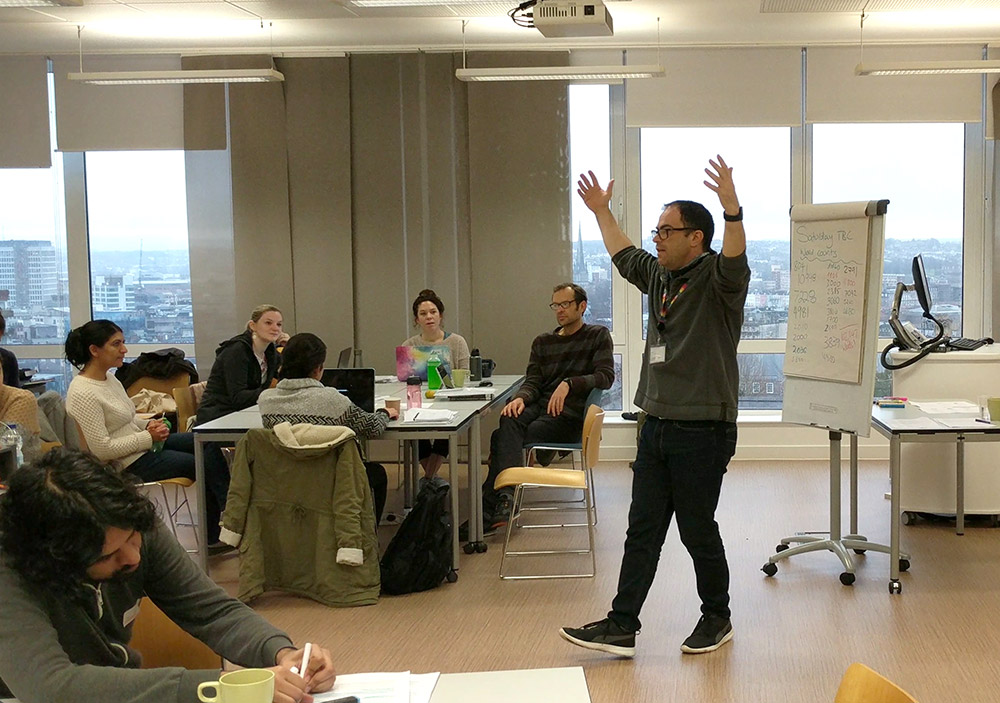Dr. Paul Spencer, the Bristol Doctoral College’s PGR Environment Development Manager, took some time during December’s Thesis Boot Camp to reflect on the aims of the weekend — and why it’s so beneficial for the postgraduate researchers who take part.
It’s a Sunday morning in mid-December, I can see great big flakes of snow falling outside the window to my right and I’m writing away along with 25 postgraduate researchers who are making stellar progress on writing that thesis. Why? Well, the Bristol Doctoral College (BDC) is running our first Thesis Boot Camp here in the School of Education this weekend. The BDC will run two more in the coming months, so I thought I’d take the time to explain what it’s all about.
What is a Thesis Boot Camp?
Simply put, it’s about getting late stage postgraduate researchers together in a peer group and setting them a seemingly impossible target of writing 20,000 words between Friday evening to Sunday evening.
Many postgraduate researchers find themselves writing alone, struggling to make progress on what can feel like an unreachable goal. Thesis Boot Camp turns that on its head and brings people together to harness the power of collective motivation and progress.
Why Thesis Boot Camp?
All creative ideas involve some sort of theft, and so it is with Thesis Boot Camp. There are many writing retreats that groups of authors often engage in and this is just an iteration of that. It’s really quite simple: provide some comfortable space, food, drink, an empathetic ear, plenty of opportunity for connection and just let the postgraduate researchers write.
What key things are we trying out here?
The key concepts that we ask the participants to experiment with are things that experienced writing tutors may be familiar with.
- That writing in a group, especially of like-minded individuals, can be hugely productive.
- Often the sense of perfectionism that doctoral researchers aspire to can get in the way of writing productively, so neatly described in Katherine Firth’s blogpost on ‘The Perfect Sentence Vortex’.
- To be productive, you first need quite a lot of material to begin with — make a big mess first and then tidy it up!
- Preparation is crucial, so participants are given lots of ideas and suggestions on how to plan and be ready for Thesis Boot Camp before it happens. This involves a bit of planning — to really think about what each chapter is trying to achieve and how it fits into an overall argument or thread that forms the backbone of the original contribution claim in a doctoral dissertation.
So, how is it going?
The first thing that has really struck me this weekend has been the overall enthusiasm and positive approach from the postgraduate researchers on this Thesis Boot Camp.
The willingness to lean into the discomfort of trying out unfamiliar approaches to writing, the collegial nature of the interactions, the supportive conversations that I’ve witnessed. It really drives home the absolute key ingredient for me, and that’s the importance of a community of writers/peers who offer each other encouragement and support collectively whilst pursuing their own writing goals.
Key ingredients
Here are a few things that really help make a Thesis Boot Camp work.
- A good, flexible venue. In this case the entire top floor of the School of Education in Berkeley Square — self-contained and able to support a DIY approach to the provision of copious amounts of tea/coffee (essential!).
- Regular meal times. A good range of wholesome food — and being able to eat together without effort — is crucial for the community dynamic. Plenty of snacks in between is also essential. Boot Camp runs on biscuits!
- Taking regular breaks. We took full advantage of our great location and went for a walk to the Cabot Tower on Brandon Hill on Saturday afternoon, and on Sunday with the sleet and snow falling, it was easy to pop over the road to the Bristol Museum & Art Gallery. As one participant said, viewing the dinosaur bones certainly brought a sense of perspective to the thesis writing.
- The rewards! I know it seems silly, but squeezy coloured Lego bricks at regular word-count milestones (5,000, 10,000, 15,000 and 20,000) are a real symbol of progress and productivity and the participants really took to the concept. The real magic of these is that you take them home, pop them on your desk and they serve as a reminder of your achievement to inspire you during the writing times to come.
And that of course is the most important part of Thesis Boot Camp: the legacy. Creating ways for postgraduate researchers to remind themselves and each other of their progress during just one weekend helps inspire them to continue to meet, talk, write and encourage each other to get to that dreamed of finish line. Being part of that is something pretty special.
The next Thesis Boot Camp will take place over the weekend of 23–25 February 2018. To find out more — and submit an application to take part — visit our Thesis Boot Camp page


